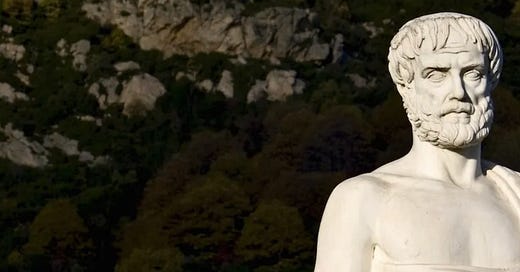It’s interesting to me that when we look for guidance on big topics like, ”What does it mean to be a good person?”, or “What makes for a meaningful, worthwhile life?”, many of the canonical texts we regularly refer to are very old. Nicomachean Ethics, Meditations and the Bible, for instance, were written ~2K years ago.
What should we make of this? Perhaps we largely ‘discovered’ the answers to these questions a few thousand years ago, the answers to them don’t change over time, and there’s little need for further inquiry. Or, perhaps there is more understanding, excavation, and evolving to do, but we maybe haven’t spent as much time on them in part because religion has had such a strong grip on all of us (in the broad, human sense) for such a long time.
A question this brings up: should we ‘expect’ frameworks on morality, or virtue ethics, or what it means to live a good life, to evolve over time? And if so, why? What’s the ‘job’ they’re doing? And what circumstances warrant their re-examination or evolution?1
And if the answer is, ‘yes, we’d expect these to evolve’ (I suspect it is), then intuitively now feels like it’s probably a pretty important time to be thinking about these questions for at least a few reasons.
For one, religiosity—the dominant moral framework for most of the last few thousand years—is at an all-time low, and continues to decline. What takes its place?
Second, AI raises these questions anew—both in the context of the treatment of AI (model welfare, etc.), but also in reaction to the rapidly changing human conditions that result from AI. If we live forever, or if work goes away, what does it mean to live a good and meaningful life? How do the virtues we aspire towards and our moral code change in light of those things? While possible, it feels unlikely that the historically dominant frameworks are entirely robust to this degree of change.
If we accept for a moment that morals ‘should’ evolve, and today’s rapidly changing world demands their reexamination, then how do we reignite our collective moral imaginations?
At the very least, discussing these topics more seems worthwhile. But I also wonder what it would look like to ‘imagine’ or ‘innovate’ more proactively/systematically. EA is/was an interesting case study—there’s a clear ethical framework that’s compelling to many (and in addition to the religious ‘believing’ part, it was also to build the religious ‘behaving’ part with a real community around it). It’s the closest ‘non-religious religion’ to get momentum that I’ve been proximate to. If we wanted more EA-esque experiments, how would we seed those? Institutions that focus on moral imagination/experimentation? A future focus area for philanthropy? An ‘idea machines incubator’, but focused on morality, virtue ethics, the good life?
As I write this, I’ll name that there’s something about using the words ‘innovation’ and ‘morality’ in the same sentence that feels a bit icky or inauthentic. That may be true, I’m not sure. But I do increasingly feel both that these are important questions, and that our answers to them feel potentially outdated given the rapid change we’re going through/about to go through. There’s an emerging gap. Being thoughtful about what could or should fill that gap seems worthwhile.
Noting that I’m not being especially clear in defining or differentiating between the subjects of ‘morality,’ ‘virtue ethics’ or ‘the good life.’ I’m not quite sure what the right ‘parse’ is yet.



It feels like “idea machines” are an exciting option that AI could naturally help with as an idea generator.
In addition to religion’s grip, we may look to certain ones for effective modern wisdom because of a positive survivorship bias – their moral advice and perspectives have survived millennia of testing, and we’ve forgotten the ones that haven’t. Another interesting way for AI to help here could be to simulate countless scenarios that rapidly test emerging moral systems and help quickly filter out incomplete ones.
Great questions, Nan. I’ve found myself asking similar questions of late. I realized I don’t have a clear vision of what qualifies someone as “a good man” anymore. To be called such would have been high praise to my grandfather, but now it sounds antiquated. I’ve been trying to define for myself what would earn and give the phrase meaning again.
The question was my inspiration for an upcoming @Interintellect salon on Teddy Roosevelt. Would love for you to join and share your thoughts about what he could teach us about what it means to be a good person and life a meaningful life!